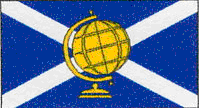|

The Scotland-UN Committee
Self-determination
What does
international law say?
James Wilkie
The right of
identifiable “peoples” like the Scots to decide their own futures and
run their own affairs is one of the most basic principles of
international law. It is stressed right in the very first article of
the Charter of the United Nations Organisation, which sets out the
purposes of the UN. Article 1 Par. 2 of the Charter states:
"To develop friendly
relations among nations based on respect for the principle of equal
rights and self-determination of peoples, and to take other appropriate
measures to strengthen universal peace;"
The Charter nails the
UN’s colours to the mast with its assertion of the fundamental principle
of "equal rights and self-determination of peoples", but the law has
been expanded and clarified in several other documents that are
constituent parts of the UN's International Bill of Human Rights. The
Bill of Human Rights is actually a portfolio that includes central
measures of international law like the Universal Declaration of Human
Rights. The European Convention on Human Rights is basically just a
legal codification of these universal rights in a judicially actionable
form.
The two main
instruments of international law that codify self-determination are the
UN International Covenant on Civil and Political Rights, and the
UN International Covenant on Economic, Social and Cultural Rights,
both of which expand Art.1 Par. 2 of the Charter into more detailed
statements. The first articles of both of these Covenants are
identical:
Article 1
1.
All peoples have
the right of self-determination. By virtue of that right they freely
determine their political status and freely pursue their economic,
social and cultural development.
2.
All peoples may,
for their own ends, freely dispose of their natural wealth and resources
without prejudice to any obligations arising out of international
economic co-operation, based upon the principle of mutual benefit, and
international law. In no case may a people be deprived of its own means
of subsistence.
3.
The States
Parties to the present Covenant, including those having responsibility
for the administration of Non-Self-Governing and Trust Territories,
shall promote the realisation of the right of self-determination, and
shall respect that right, in conformity with the provisions of the
Charter of the United Nations.
It should be noted
that the above Paragraph 3 lays down an obligation to actively promote
the right of self-determination, in addition to respecting it.
The definition of a
"people" as an entity entitled to exercise the right of
self-determination is not contained in the legal instruments, but is set
out in other UN documents. The conditions envisage a cohesive social and
cultural entity with its own distinctive character and a lengthy
history, including previous self-government, and it implies a
relationship with a particular territory.
Scotland fulfils all
of the conditions many times over, as can be read in the statement of
Scotland’s Status as a Nation, on this website.
These UN statements of the law are the basis for all the
others like the Helsinki Final Act, amongst others, all of which are
just re-affirmations of the ground principle. The absolute classic is the
restatement by the Conference on Security and Cooperation in Europe at
its follow-up session in the Hofburg Palace in Vienna in January 1989:
"[The participating
states] confirm that, by virtue of the principle of equal rights and
self determination of peoples, and in conformity with the relevant
provisions of the [Helsinki] Final Act, all peoples always have the
right, in full freedom, to determine, when and as they wish, their
internal and external political status, without external interference,
and to pursue as they wish their political, economic and cultural
development. (Questions Relating to Security in Europe, No. 4)"
That particular
statement by the CSCE resulted in the formation of 24 newly independent
states in Central Europe and Western Asia after the breakup of the
Communist system.
There have been
numerous other re-affirmations of the law on the self-determination of
peoples by the UN General Assembly and others.
The relevant
international law is now crystal clear and unchallengeable, and it
overrides anything contained in the devolution or subsequent Westminster
legislation.
This international
law does not relate directly to independence or any other particular
form of government. It is completely neutral in that respect. What it
does is to guarantee the Scottish people an absolute right to make their
own decision on what form of government they want, to decide that in
their own time, and with no interference by anyone else, in London or
elsewhere.
It is therefore
totally untrue that the Scots must ask permission to hold a referendum
on independence, to hold it at any particular time, or that London has
any right of veto over their decision. The relevant actions of the
Scottish Government are already perfectly legal under a higher law than
that of the United Kingdom.
As a nation falling
comfortably within the United Nations definition of a “people” entitled
to exercise the right of self-determination, it is up to the Scots, and
them alone, to decide their own future and the form of government they
wish to adopt.
You can download a .doc version of
this paper here |

